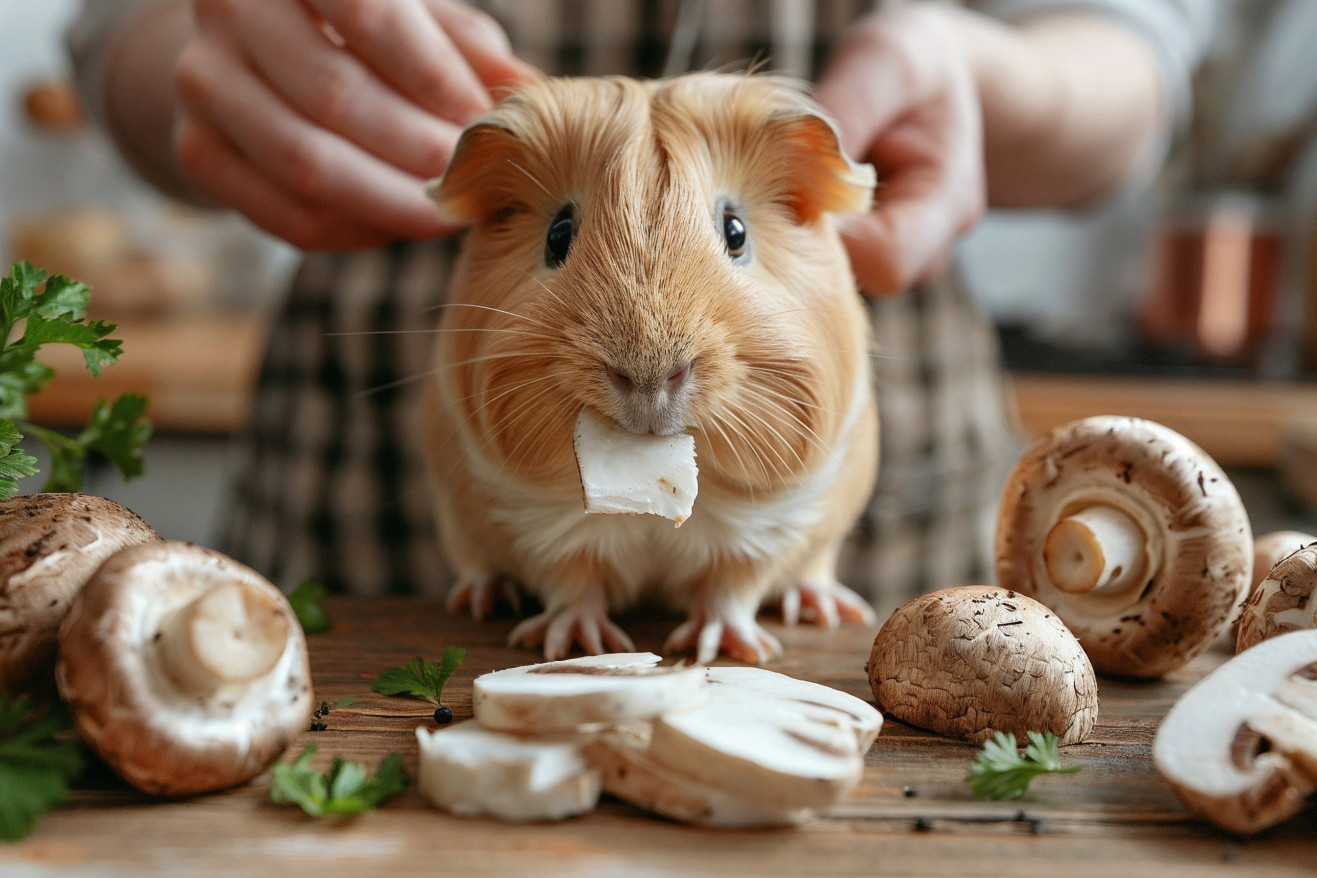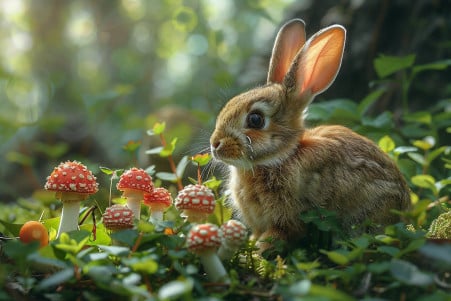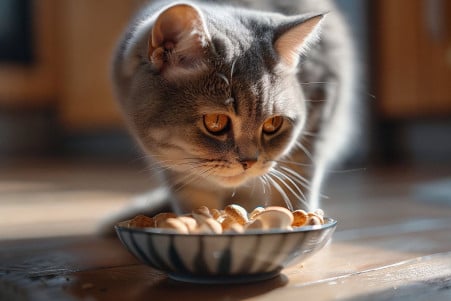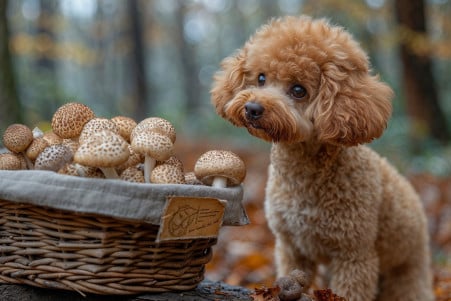Can Guinea Pigs Eat Mushrooms? Safe Varieties & Risks Explained
3 March 2024 • Updated 2 March 2024

Mushrooms are a popular food for people, but can your guinea pig enjoy them as well? While guinea pigs can eat certain store-bought mushrooms, like white and portobello mushrooms, in small amounts, these mushrooms don’t have much nutritional value for guinea pigs.
On the other hand, wild mushrooms are toxic and should be avoided altogether. Mushrooms can be given to guinea pigs as a treat, but they should never be a regular part of their diet.
To explain why some mushrooms are OK for guinea pigs and others aren’t, we’ll look at the most up-to-date information from veterinary science, nutrition, and toxicology. We’ll also consider guinea pigs’ dietary needs and limitations and how different mushrooms can impact their health. By reviewing the research on the subject, we’ll be able to give you a complete picture of how to safely feed mushrooms to your guinea pig.
Can guinea pigs eat mushrooms?
Meeting the Nutritional Needs of Guinea Pigs
One of the most important dietary requirements for guinea pigs is vitamin C, which is an essential nutrient that guinea pigs need to get from their diet since they can’t produce it on their own.
In the wild, guinea pigs eat a diet that’s high in fiber, and this is a trait that’s been passed down to their domesticated descendants, who can often get all the fiber they need from a diet that’s supplemented with plenty of hay.
As noted by NCBI Bookshelf, guinea pigs’ preference for fibrous plant material is a good match for their digestive system’s ability to handle high-fiber foods.
Getting the right balance of minerals is important, and this includes making sure that guinea pigs get the right ratio of calcium to phosphorus, which can help prevent health problems like bladder stones.
Mushrooms can be a problem in this area, and while some types of mushrooms are safe to feed to guinea pigs in small amounts, the nutritional value of mushrooms for guinea pigs is low. Not only do mushrooms not contain vitamin C, which is essential for guinea pigs, but they also don’t provide much in the way of other nutrients that are important to the animals.
It’s important for pet owners to realize that mushrooms, as a potential treat, may not provide the nutrients that are important for a guinea pig’s health. With that said, an understanding of the nutritional needs of guinea pigs can help pet owners make informed decisions about whether to offer mushrooms to their pets as an occasional treat.
Safe Mushrooms for Your Guinea Pig
If you want to feed your guinea pig mushrooms, it’s best to err on the side of caution and stick to the most common store-bought mushrooms, such as white, button, and portobello mushrooms.
All three of these mushrooms (which are actually the same species at different stages of maturity) are safe for guinea pigs to eat. Pet Keen notes that you should feed your guinea pig these mushrooms raw, as their digestive systems aren’t equipped to handle cooked food.
It’s also important to make sure that you’re feeding your guinea pig the right portion size. In this case, a piece of raw mushroom the size of a penny is more than enough for your furry friend.
You should also make sure that you’re only feeding them this treat occasionally, no more than once a week, to avoid throwing off their diet. In general, it’s a good idea to start with a small amount of mushrooms and see how your pet reacts to them.
As with all treats, the key is to make sure that you’re feeding your guinea pig mushrooms in moderation. Mushrooms aren’t a necessary part of a guinea pig’s diet, but they can be a fun treat if your pet enjoys them.
Just make sure that you’re keeping a close eye on how often you’re feeding them this treat, and that you’re still feeding them a diet that’s nutritionally balanced and complete.
Toxicity Risks of Mushrooms for Guinea Pigs
The risks of feeding guinea pigs mushrooms are particularly high because wild mushrooms, which can look identical to safe mushrooms, can contain toxins that are fatal to guinea pigs. According to the Merck Veterinary Manual, mushrooms from the genus Amanita, including Amanita phalloides, contain cyclopeptides and amanitins that have been linked to cases of mushroom toxicosis in animals. Guinea pigs that eat these mushrooms can experience severe symptoms, including death.
The difficulty of identifying toxic mushrooms is illustrated by the fact that even experts often have to use lab tests, including PCR assays, to identify the species. This means that it’s nearly impossible for guinea pig owners to identify toxic mushrooms, which is why it’s best to avoid wild mushrooms altogether.
Clinical signs of mushroom toxicosis in guinea pigs, including gastrointestinal signs, depression, and liver damage, usually develop after a latent period of 6–12 hours, so it’s important to seek veterinary care as soon as possible.
The lack of specific treatments for mushroom toxicosis also highlights the importance of preventing the condition, as repeated exposure to toxic mushrooms can lead to chronic health problems. This makes it important to focus on feeding guinea pigs a diet that’s free of potentially harmful foods to ensure their health.
Understanding Mushroom Toxicity
In order to understand the danger mushrooms pose to guinea pigs, it’s important to understand the chemical compounds found in toxic mushrooms.
Toxic mushrooms can contain a number of different toxins, including amatoxins, which are found in the Amanita species, and work by disrupting RNA polymerase II, which inhibits protein synthesis and causes cell damage.
According to a study published in the Journal of Agricultural and Food Chemistry, these toxins can lead to severe liver and kidney damage and even death. Meanwhile, other toxins found in mushrooms, including muscarine and psilocybin, can cause a range of symptoms from gastrointestinal distress to neurological symptoms like hallucinations, according to the NCBI Bookshelf.
The latency period between ingestion and the onset of symptoms can also vary. For example, symptoms of amatoxin poisoning usually appear within 6–12 hours of ingestion but can be delayed up to 24 hours, which can make it difficult for pet owners to realize their pets are in danger before it’s too late.
Guinea pig owners need to take steps to prevent their pets from accidentally ingesting toxic mushrooms. This includes making sure their pets can’t access areas where toxic mushrooms might be growing and being careful about the source of any mushrooms they feed their pets. By learning about the chemical compounds that make some mushrooms toxic, pet owners can help protect their pets from these hidden dangers.
Do Guinea Pigs Like Mushrooms?
Guinea pigs are natural foragers, and their foraging instincts are one of the reasons that they are so fun to watch and interact with. But do guinea pigs like mushrooms, and are they safe for them to eat?
In the wild, guinea pigs are foragers that eat a diet that consists mainly of grasses and other high-fiber plants. According to VCA Animal Hospitals, wild guinea pigs in South America eat a variety of foods including fruits, leaves, and high-fiber grasses, which are important for their digestion and dental health.
According to the RSPCA Knowledgebase, guinea pigs are natural grazers that eat all day long, which means that they need constant access to fresh hay and grass.
A guinea pig’s diet should be varied to ensure that it meets all of their nutritional needs, but it should also include a variety of foods to keep them interested and engaged.
Mushrooms are not a part of a guinea pig’s natural diet, but guinea pigs are naturally curious animals. However, VCA Animal Hospitals explains that guinea pigs develop food preferences early in life and are unlikely to change their minds about foods they have decided they don’t like.
While it’s possible that your guinea pig will be interested in trying mushrooms, it’s important to remember that they are not part of their natural diet and they aren’t necessary for their health.
If you do decide to offer your guinea pig mushrooms, it’s important to do so carefully. While you can use your guinea pig’s reaction to different types of mushrooms to determine their preferences, mushrooms should be offered only as an occasional treat in addition to their regular diet.
Their regular diet should consist of foods that are high in fiber and that mimic their natural diet as closely as possible.
Final Thoughts: Guinea Pigs and Mushrooms
In this article, we’ve delved into the relationship between guinea pigs and mushrooms—a topic that requires a lot of nuance. While some store-bought mushrooms, like white and portobello, can be given as a treat every once in a while, it’s important to remember that they don’t offer much in the way of nutrition for guinea pigs.
Because mushrooms don’t contain essential nutrients like vitamin C, they shouldn’t make up a large part of a guinea pig’s diet, which should be based on high-fiber foods like hay.
The dangers of wild mushrooms can’t be overstated. To make sure your guinea pig stays safe and healthy, it’s essential to avoid wild mushrooms because of the extreme danger they pose. It’s up to us as pet parents to make sure we’re feeding our pets a well-rounded diet that meets their nutritional needs and to make sure they stay away from things that could harm them.
This includes the food we offer them. By learning about the best practices for feeding guinea pigs, we can make sure we’re feeding our pets a diverse diet that doesn’t put them at risk. Let’s make sure we continue to prioritize our guinea pigs’ health by making sure they get the care they need.


